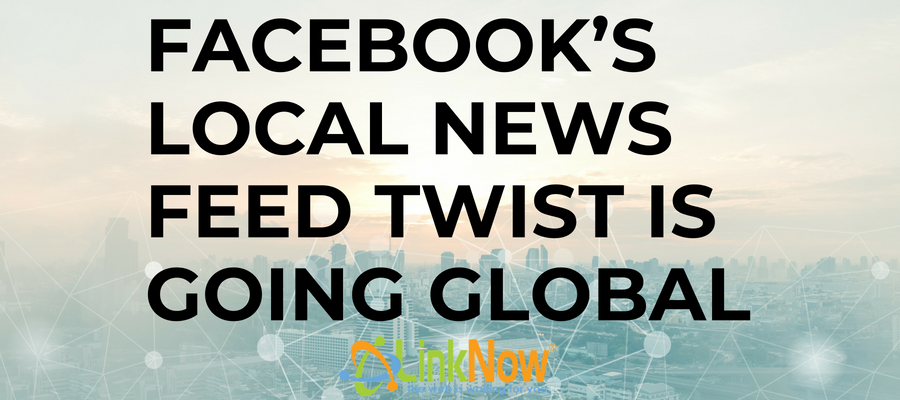
They say that all politics are local and if Facebook is any type of indicator, then it looks like all news may be now too! In January 2018, Facebook committed to surfacing more localized news within its News Feed. This means that users across all regions and with all operational languages are now more likely to be seeing more localized news in the Facebook News Feed than may have previously been the case.
Given the ongoing data leaks furor that is currently engulfing the social media giant, it is perhaps no surprise that this announcement has flown under the media radar somewhat. However, the reality of the situation is that this does not mean that it is any less important. The local-led emphasis that Facebook has taken to its News Feed has the potential to revolutionize the news, media and content fields as users are now going to be targeted with news headlines that relate directly to their countries and local communities.
The announcement, which came shortly after Facebook also decided to update its News Feed by cutting organic reach to commercial Facebook pages, is going to be felt globally and is an indication that the most recognizable of social media sites has access to more meaningful communication between users. On top of that, it is clear that Mark Zuckerberg and co. are showing a strong commitment to delivering local content to users in a global perspective.
This development allied to the localized “Today In” hub which provides a range of town-hall type content has provided Facebook News Feeds the world over with a more local feel and, as such, has left local publishers more bullish about the prospect of making an indent in the daily algorithms that determine Facebook’s News Feed.
One of the biggest benefits that this development brings is that it prioritizes quality local news content over mass generated biased content, or fake news as it’s more commonly known, on Facebook. This is obviously a major concern given the fact that the site is struggling to regain trust among its stakeholders because of the spread of fake news and consumer date leaks in recent times.
Finally, a last benefit of this change to Facebook’s News Feed is that it helps publishers with multiple locations make inroads in different towns and cities where their news content is covered. The changes will now mean that multiple-location publishers, a description that fits many regional newspapers in the United States and Canada, will be able to appear in the News Feed of Facebook users in multiple cities provided that people in those cities are more likely than those outside of the area to read articles on the publisher’s domain. So, to put it simply, if a publisher has its articles read, shared and commented upon in a specific location then it is likely to be considered local, thereby garnering a boost in organic reach.
From the Horse’s Mouth
Like many of the changes that Facebook enacts, the modifications to the localized News Feed searches came from the very top. Commenting on the latest development in an aptly timed Facebook post from January 29th 2018, CEO Mark Zuckerberg stated that:
“Our next update on our 2018 focus to make sure Facebook isn't just fun but also good for your well-being and for society...
We're making a series of updates to show more high quality, trusted news. Last week we made an update to show more news from sources that are broadly trusted across our community. Today our next update is to promote news from local sources.
People consistently tell us they want to see more local news on Facebook. Local news helps us understand the issues that matter in our communities and affect our lives. Research suggests that reading local news is directly correlated with civic engagement. People who know what's happening around them are more likely to get involved and help make a difference.
When I traveled around the country last year, one theme people kept telling me is how much we all have in common if we can get past some of the most divisive national issues. Many people told me they thought that if we could turn down the temperature on the more divisive issues and instead focus on concrete local issues, then we'd all make more progress together.
Starting today, we're going to show more stories from news sources in your local town or city. If you follow a local publisher or if someone shares a local story, it may show up higher in News Feed. We're starting this first in the US, and our goal is to expand to more countries this year.
Local news helps build community—both on and offline. It's an important part of making sure the time we all spend on Facebook is valuable. I'm looking forward to sharing more updates soon.”
It is believed that that one of the primary motives behind this decision is a result of the self-guided tours of the US that Zuckerberg took last year. As mentioned previously, the changes to a more localized News Feed is the latest in a series of three recent announcements regarding content more broadly. The first announcement related to a general overall of the feed which looks set to de-emphasize generic news and other social content.
After that, Zuckerberg announced that Facebook would do its utmost to try and promote news outlets and publications that were deemed to be trustworthy. This latter modification came with the proviso that this ranking of news outlets would come after a consultation process with users about what sites are deemed more trustworthy and impartial than others.
However, despite this trio of important content changes, many believe that the modifications do not go far enough. Critics of the recent announcement have stated that Facebook may have made some minor changes which are to be welcomed but, in essence, the site remains insistent on arguing that it’s not really in a position to make a judgment about the stuff it shows its almost two billion users.
Whether it is fair to criticize Facebook for passing the buck on this remains to be seen, but it is clear that the social media giant is looking to repair its image after what has been a somewhat grueling number of months from a PR perspective. The recent modifications to the News Feed are a clear sign that Facebook is looking to go back to basics rather than attempting to reinvent the wheel. With that in mind, what will these changes mean for the average user as well as publishers, both local-centric and online/global brands?
Back to Basics for Facebook?
There is no doubt about it, Mark Zuckerberg took very little time in getting to work on his new year’s resolutions for 2018. Two weeks before the Facebook CEO announced two significant changes to how localized news content would receive an organic ranking boost from the site, he had already announced the roll-out the first of a trio of measures that set to change the appearance of Facebook’s News Feed.
The biggest part of this move will see Facebook begin to return to a situation where it will start to show its users more posts from their friends and family and consequently fewer posts from biased publishers and global brands. Facebook has stated that this move was made with the intention of encouraging users of its site to interact more with the stuff that they actually see and experience on a daily basis rather than a global news story that could be as easily accessed from a more traditional online news outlet. The rationale behind this decision is that a user will probably be more likely to comment and share a news story that actually relates to them rather than one posted by a business or major news outlet.
Commenting on the matter in a Facebook post, Zuckerberg made what some may see as a surprising statement that:
“By making these changes, I expect the time people spend on Facebook and some measures of engagement will go down. But I also expect the time you do spend on Facebook will be more valuable.”
He later added that:
“We built Facebook to help people stay connected and bring us closer together with the people that matter to us. That's why we've always put friends and family at the core of the experience. Research shows that strengthening our relationships improves our well-being and happiness.
But recently we've gotten feedback from our community that public content—posts from businesses, brands and media—is crowding out the personal moments that lead us to connect more with each other.”
The media interest and general significance of this announcement is important for a number of reasons. Firstly, it is not very good news for online publications who rely on Facebook for traffic or for businesses that are using it as their primary source of marketing. It is clear that Facebook is telling these businesses that their content won’t spread as far as it did in the past on the News Feed.
On top of that, the admission from Facebook CEO Mark Zuckerberg that he expects users to spend less time on Facebook is expected to be news that potential investors are unlikely to be too keen on. If you think of it like this, the more time people spend on Facebook, the more ads that they will consume, and the more money Facebook can make from ad-generated revenue in the process. By contrast, the less time that the average user spends on Facebook, the less that they can be expected to take in from typical revenue streams.
Similar to the criticisms that Facebook faced following its decision to modify the localized news content on its News Feed, many people feel that the ‘back to basics’ approach that Facebook has adopted in this respect will do very little to curb the spread of fake news on the site. The reason that they feel like this is because, despite the changes, users will still be able to share links from almost any place, including partisan unauthorized sites and those pushing conspiracy theories.
When all is said and done, it is clear that this development is an attempt by Facebook to take a short-term hit (less time spent on Facebook) in exchange for long-term gain (happier users who will come back more often). It remains to be seen if this gamble will deliver a dividend as it has the potential to alienate a major set of users: those who create free content that appears on Facebook. The social media giant already has a reputation for messing around with publishers of this nature by regularly changing the algorithm they use. So, with all that in mind, it will be interesting to see if these changes will have the desired effect for Facebook.
What are the Consequences of These Changes Globally?
Like anything that Facebook does, there has been a range of contrasting views expressed regarding the recent modifications to the site’s News Feed. Some publishers and civil society groups have reacted with alarm to the decision. Perhaps this has been most acutely felt in Guatemala where some journalists have reported that readership has fallen by half overnight as a result of the many of their previously accessible sites disappearing from most social media posts.
If this change was to be transposed globally, then there is every chance that the media’s ecosystem could be damaged beyond all repair. This could make it extremely difficult for media outlets and small businesses to reach the share of the market that they previously enjoyed.
However, it appears that Facebook is serious about these changes and it is up to us as users to adapt and see what the new social media landscape means.

